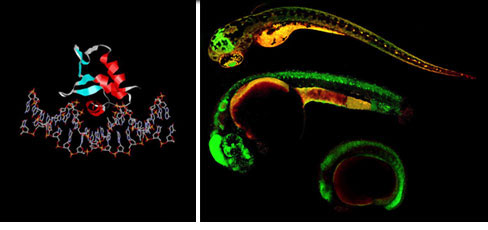The establishment of cell identities is at the heart of developmental biology. The fertilized egg is pluripotent, able to produce all cell types of the body. As development proceeds, however, cells lose their plasticity and acquire individual cell fates. The molecular underpinnings of this transition are being actively studied at the University of Utah. For example, intercellular signaling is one critical mechanism that allows organisms to coordinate the development of large groups of cells. Sequence-specific transcription factors are also key for specifying cell fates. What genes are targeted by these factors? And how do they work? DBIG investigators use diverse approaches to address these questions, including genetics, molecular biology, biochemistry and genomics. In addition, the strong community of DBIG members studying fundamental transcriptional mechanisms contributes to our understanding of how sequence-specific factors function.


